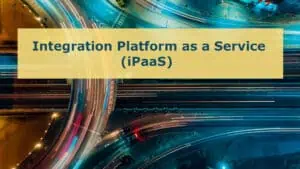Does an Integration Platform as a Service (iPaaS) solve the problems of increasingly inconsistent data from different applications? Does it regulate traffic for automation? This series explains the use of iPaaS.
All you need to do is take a look at your own company to understand how the proliferation of software can get out of hand. Today there are numerous business applications that cover every imaginable challenge for a company. These applications are usually easy to use, easy to set up and often require little training.
However, they create a patchwork of heterogeneous data that is poorly connected or not connected at all. The result is an increasingly inconsistent data structure whose volume is constantly increasing. Correctly linked, this data is the basis for transparency, high information quality and the opportunity to make quick and competent decisions.
With iPaaS solutions, businesses can continue to use the single application that works best for them and connect them together in a way that adds value and structure to the business. So what’s behind it?
What is iPaaS?

iPaaS stands for “Integration Platform as a Service”. At their core, they are cloud-based integration platforms that enable companies to connect, synchronize, centralize and seamlessly integrate various applications, systems and data. This means you reduce administrative effort and error-prone manual processes and improve data quality, IT security and connections within the company and with partners. The result: more efficiency, greater flexibility, easier handling and a better overview. iPaaS tools take a holistic approach that works company-wide and can be scaled as required. This makes them sustainable solutions, regardless of the size of the company.
Increase the value of SaaS applications
iPaaS solutions like Celigo can be used to create standardized data flows between applications that are brought together in different parts of the company (and beyond). The data and systems can be combined in any way depending on business needs – be it matching customer data between CRM and e-commerce platforms or synchronizing inventory information between warehouse management systems, online shops and delivery services. In short: An iPaaS solution enables companies to harmonize data in real time and optimize processes. Both technically experienced employees and employees with limited IT knowledge can integrate, manage and keep processes for their departments up to date.
What advantages do iPaaS solutions offer?


Easy integration without programming knowledge: Modern iPaaS solutions are characterized by their simple and solution-oriented handling. Applications and systems can be seamlessly integrated without requiring extensive programming knowledge. Low-code integration not only speeds up the integration process, but also simplifies access for companies without their own IT department and technical know-how.
Automated business processes and higher productivity: By largely automating business processes, iPaaS enables the creation of customized workflows and rules to control and process data flow. This helps accelerate processes, minimize human errors, increase efficiency and improve operational agility.
Scalability and Flexibility: Because iPaaS solutions are hosted in the cloud, they offer complete scalability and flexibility according to the needs of the business. The most valuable iPaaS solutions incentivize businesses to create more connections. As companies grow, they can easily add resources without having to plan for large-scale reinstallations. Applications and processes can just as easily be removed again if necessary.
Redistribution of personnel capacities: Modern iPaaS solutions are very intuitive and enable even non-technical users to automate their individual business processes. The automations can be managed without IT, with the possibility of delegating the integrations for day-to-day maintenance and operations to users with less technical expertise. This means that IT specialists have more capacity for technical innovations and future projects.
Lower integration costs: Traditional integration solutions often require significant investments in hardware and software development. The more extensive the applications and processes, the greater the time and resource expenditure. iPaaS solutions, on the other hand, minimize costs by using pre-built connectors and tools that speed up the integration process.
Features to look for in an iPaaS solution
Integration platform-as-a-service solutions ideally include:
- Pre-built automations: the ability to automate business processes up to 100 percent using built-in best practices
- Robust development tools: powerful integration tools for tech-savvy users to create complex integrations with custom coding
- AI-based error handling: the ability to view and automatically resolve errors that occur during data transfer
- Platform and connectors as a ‘managed service’: Updates to connectors as well as new functions and updates to ready-made solutions by the provider, so that the business value of the platform constantly increases
- Reusable templates: Integration templates to encourage rapid development of new integrations
- Role-based access control: Only authorized team members can create or update integrations.
- Enterprise-grade security: enterprise-grade data security including SSO (single sign-on)


iPaaS: The key component of any automation strategy
iPaaS technologies are becoming an increasingly important part of the technology portfolio. The current generation of iPaaS solutions allows companies to centralize integrations and automation on a single platform while significantly reducing the time and resources required to manage them.
A well-thought-out integration strategy based on an iPaaS solution like Celigo ensures that manual processes, lack of visibility and costly mistakes are avoided. At the same time, the company has the opportunity to adapt to the constantly changing business environment.
| The Integration Platform as a Service (iPaaS) series includes the following parts: 1) What is iPaaS (Integration Platform as a Service)? |

